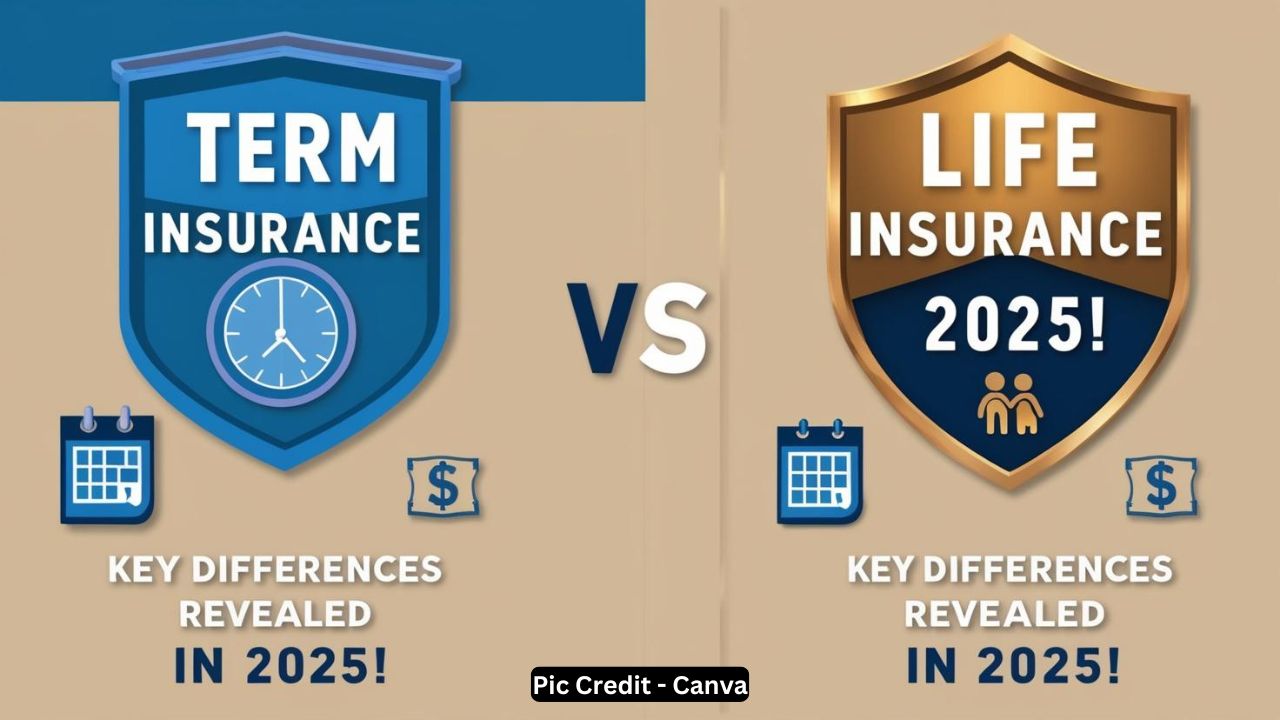Term Insurance vs Life Insurance : Financial plans need life insurance coverage to protect the financial stability of family members through adverse events. The different types of life insurance plans exist but they do not match in all respects.
From all alternatives available the public selects term insurance along with life insurance (Term Insurance vs Life Insurance) as their preferred options. Your needs and financial objectives will determine your best life insurance choice by learning about the plan distinctions.

What is Term Insurance?
Definition and Features
A term insurance plan is a type of life insurance that provides coverage for a specific period (term). If the policyholder passes away during this term, the insurer pays the death benefit to the nominee. However, if the policyholder survives the term, no maturity benefit is usually provided.
Read More : Omnisend vs Mailchimp: Which Email Marketing Platform is Best for eCommerce?
Key Benefits of Term Insurance
- Affordable Premiums – Affordable premiums stand as a prominent benefit of term insurance because of its low cost. The insurance premiums for term insurance remain substantially cheaper than those of life insurance.
- High Coverage – People can secure a large death benefit through this policy because it provides both high coverage and reasonable pricing.
- Customizable Tenure – People purchasing insurance get options for coverage periods between 10 years to 35 years which match different financial targets.
- Death Benefit – The nominee receives a lump sum amount in case of the policyholder’s demise during the policy term.
Who Should Opt for Term Insurance?
- People who wish to get financial protection at a budget-friendly rate for their loved ones.
- People with financial dependents, such as young professionals and parents.
- The policy fits people who need substantial insurance coverage at a low-priced premium.

What is Life Insurance?
Definition and Features
The life insurance plan functions as a comprehensive financial instrument which provides continuous protection for the full life or extended timespan. The majority of life insurance policies extend advantages including death benefits together with bonuses and maturation benefits and investment possibilities.
Read More : Omnisend Reviews : The Dark Side of Email Marketing and How Omnisend Can Help
Key Benefits of Life Insurance
- Lifetime Coverage – The majority of life insurance policies continue to safeguard policyholders until their passing.
- Maturity Benefits – Experience advantages are included in life insurance since it provides savings and investment features that differ from term insurance programs.
- Flexible Premiums – Life insurance premiums are adjusted to higher levels to also give policy owners a cash reserve accumulation option.
- Bonus and Additions – A large number of life insurance contracts include benefits through loyalty additions as well as guaranteed bonuses and dividends payments.
Who Should Opt for Life Insurance?
- The target audience includes persons who seek sustained financial planning together with wealth accumulation.
- The policy suits individuals who need coverage against death while simultaneously seeking investment returns from their insurance policy.
- Such policyholders choose insurance plans that include maturity benefits and bonus options.

Term Insurance vs Life Insurance: Key Differences
| Feature | Term Insurance | Life Insurance |
| Coverage | Covers only premature death | Covers both premature death and survival till maturity |
| Premiums | Lower and more affordable | Higher due to additional benefits |
| Maturity Benefits | Usually not provided | Provided in most cases |
| Death Benefit | Payable | Payable |
| Policy Term | 10 to 35 years | 5 to 30 years or lifetime |
| Surrender Value | No surrender or paid-up value | Paid-up and surrender value available |
| Flexibility | Not flexible | Highly flexible |
Term Insurance vs Life Insurance : Detailed Comparison
Read More : 7 Best Places to Visit in South Korea In 2025 for an Unforgettable Trip
- Coverage
The coverage of term insurance remains exclusive to premature death events experienced during its policy period. Life insurance provides financial coverage for premature death while also delivering survival benefits to protect financial security from death to old age.
- Premiums
People can buy term insurance at lower premiums because its benefits do not extend past death claims. Life insurance premiums contain higher costs than term insurance because they have combined elements of savings and investments.
- Duration of Coverage
The duration of term insurance plans ranges from 10 to 35 years yet life insurance lasts between 5 to 30 years together with the potential for lifelong coverage.
- Bonuses and Additions
Term insurance lacks bonus additions and guaranteed benefits and other benefits that life insurance offers to policyholders.
- Surrender and Paid-Up Value
The suspension of premium payments by life insurance policyholders might result in either paid-up value or surrender value under their current policy conditions. The surrender value within term insurance policy is nonexistent.
- Flexibility
Policyholders who have life insurance have access to flexible benefits for withdrawing cash value and taking loans as well as adjusting their coverage amounts. The main feature of term insurance includes a permanent coverage amount without any accumulated value feature.
Read More : Omnisend Review 2025 : A Deep Dive Into Its Features & Pricing
Term Insurance vs Life Insurance : Which One Should You Choose?
| Choose Term Insurance if… | Choose Life Insurance if… |
| You need a high coverage at a low cost. | You want a savings or investment component along with life coverage. |
| You only need coverage for a specific period. | You prefer long-term security for yourself and your family. |
| You do not require maturity benefits. | You want maturity benefits along with insurance. |
Term Insurance vs Life Insurance : Which One Is Better?
The financial tools of term insurance along with life insurance serve different purposes to match individual requirements. The primary purpose of term insurance is high coverage with affordable rates whereas life insurance creates additional financial benefits above basic risk coverage. Use your financial objectives and dependent commitments and long-term goals to identify the policy which fits your needs best.
FAQs
What is the biggest difference between term and life insurance?
Term insurance covers only death during the policy period, while life insurance covers both death and survival benefits.
Which one is more affordable?
Term insurance is more affordable as it only provides risk coverage without savings benefits.
Can I convert a term insurance policy to life insurance?
Some term policies offer conversion options, but it depends on the insurer’s terms.
Which policy is better for long-term savings?
Life insurance is better if you want maturity benefits and investment growth.
Who should buy term insurance?
Anyone looking for affordable financial protection for their family should opt for term insurance.


2 thoughts on “Term Insurance vs Life Insurance: Key Differences Revealed In 2025!”